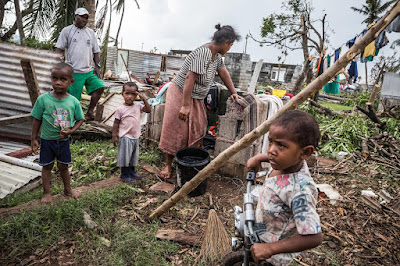 |
| Tiloko, his wife Leba and their children © UNICEF Pacific/2016/Sokhin |
In Yaqeta village, Yasawa Islands, 39-year-old Leba sits on a mat in the place where her family house stood, before it was destroyed by Tropical Cyclone Winston. She is joined by her husband Tiloko and their five children Adi, Makereta, Emosi, Waisake and Vasemasa, aged from 16 to just one.
“On the night of the cyclone we all stayed at home,” Leba says. “The wind got stronger and stronger, and then the breadfruit tree fell on top of our house and destroyed it.”
Luckily the family managed to escape, and no one was hurt. “We ran to my uncle’s house, but it was destroyed soon after that,” Leba continues. “So we ran again to the next house, where we finally got to safety.”
Leba’s family lost all their food in the cyclone. They received food rations in the village hall, but even that is running out. Her daughter Adi, 13, sits beside her mother listening, and quietly adds her own experience of the night.
“I was with my family in a house,” Adi says. “Then I saw our house starting to collapse. I grabbed my brother Waisake and we ran. I was so scared. We ran from house to house three times. Now I am heartbroken to see the home where I was born and raised in pieces.”
 |
| Adi, 13, and her 4-year-old brother Waisake © UNICEF Pacific/2016/Sokhin |
Most of the people in Yaqeta village went to sleep in their homes the night cyclone Winston was set to hit Fiji. Village Headman Moapi Seuseu said they knew there was a cyclone coming, but they didn’t know when it was going to hit them.
“We usually get a warning from the radio, but Saturday the radio was broken,” he says. “So we all went to sleep inside our houses. The mobile network was down too. These are the two information sources we rely on.”
“Food and water is what we need now, because our farms are gone,” Moapi adds.
 |
| Vasemaca and Adi in their damaged classroom at Yaqeta District Boarding School © UNICEF Pacific/2016/Sokhin |
“I was really scared,” Adi Laite says. “It started raining and the winds got stronger. The house started to flood and the leaves started flying into the house”
The family watched in horror as their neighbour’s house was torn apart by the strong winds. Their own home was also being destroyed, first the kitchen, then the shower. That’s when her father Lasaro Vota knew he had to move his children fast. “I told my family to leave everything – the TV, radio, everything don’t worry about it and go,“ he says.
Battling against the ferocious winds, Lasaro took the children to a neighbour’s house one-by-one. He pauses and points to the bandage on his hand and says “I got this taking my third child to safety, I lifted my hand to protect my face from a piece of flying tin roofing”.
 |
| Lasaro Vota, his wife and children clean the debris of their home © UNICEF Pacific/2016/Sokhin |
After his family was secure, Lasaro ignored his own advice and made a final trek back to his home through the strong winds to salvage what he could. He realised his mistake when he couldn’t close the door to his home and the cyclone reached peak intensity. “I couldn’t move out of the door, the wind was so strong so I turned around, opened our deep freezer and took shelter in there” he says.
Lasaro waited until 12am when the cyclone died down to leave the relative safety of the deep freezer and seek out his family who were thankfully safe at their neighbours.
In the aftermath of the cyclone Lasaro is clearing the debris around his home. He ignores the bandage on his hand, saying “I’m just cleaning up as much as I can. We’re living on coconut water and loose breadfruit and doing what we can to survive.”
 |
| UNICEF supplies being offloaded from a boat at Koro Island © UNICEF Pacific/2016/Hing |
After a natural disaster, many people’s immediate reaction is to help by sending food, household supplies and clothing. However, it takes time to clear these items through customs, sort and then distribute them, meaning they reach families much later than anticipated or needed.
It is much more effective to donate cash to UNICEF and other relief organisations. UNICEF offices in Australia, New Zealand and elsewhere have set up donation lines where you can send financial assistance. You can also donate online. Your assistance will fund the purchasing of supplies, as well as transport and distribution to affected communities.
Donate online
• Australia
• New Zealand

No comments:
Post a Comment